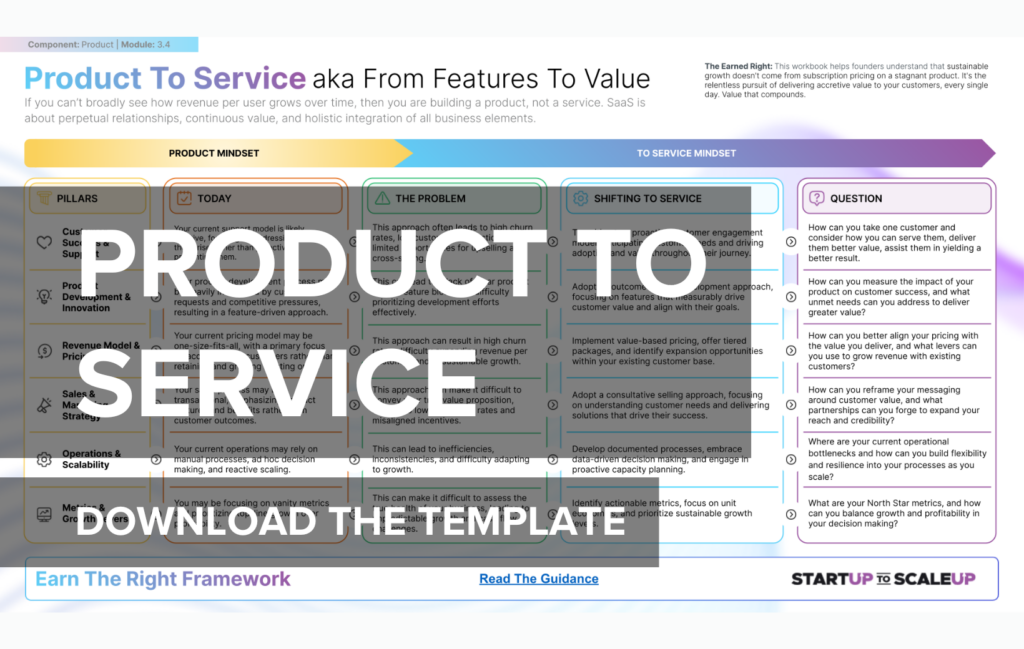How Can Startups Evolve from Product to Service?
Why is transitioning from product to service important for startups?
Transitioning from a product to a service mindset is crucial for startups because:
- Recurring revenue: It creates a more predictable, sustainable income stream.
- Customer retention: Service models focus on ongoing customer relationships.
- Increased lifetime value: Services often lead to higher customer lifetime value.
- Market adaptability: Service models can more easily evolve with customer needs.
- Competitive advantage: It’s harder for competitors to replicate a service experience.
- Scalability: Well-designed services can often scale more efficiently than products.
- Customer insights: Ongoing interactions provide valuable data for improvement.
This shift can lead to more sustainable growth and stronger market positioning.
How can startups shift from one-time sales to recurring revenue?
To shift to recurring revenue:
- Implement subscription models: Convert one-time purchases into ongoing subscriptions.
- Offer tiered pricing: Create different service levels to cater to various customer needs.
- Provide value-added services: Introduce complementary services around your core product.
- Focus on customer success: Ensure customers continuously derive value from your offering.
- Develop a product ecosystem: Create interdependent products/services that encourage ongoing use.
- Implement usage-based pricing: Charge based on consumption or value delivered.
- Create loyalty programs: Incentivize long-term engagement and repeat business.
The key is to structure your offering in a way that provides ongoing value to customers.
What strategies help startups focus on long-term customer value?
To focus on long-term customer value:
- Implement customer success programs: Proactively help customers achieve their goals.
- Personalize experiences: Use data to tailor services to individual customer needs.
- Continuously innovate: Regularly update and improve your offering based on feedback.
- Provide excellent support: Offer responsive, high-quality customer service.
- Create a product roadmap: Share future plans to keep customers excited and engaged.
- Build a community: Foster connections between customers to increase stickiness.
- Offer education and resources: Help customers maximize the value they get from your service.
The goal is to become an indispensable partner in your customers’ success.
How can founders build a customer success-oriented culture?
To build a customer success-oriented culture:
- Lead by example: Demonstrate a customer-first mindset in your actions and decisions.
- Define clear metrics: Establish KPIs that focus on customer outcomes, not just company gains.
- Empower employees: Give team members the authority to make decisions that benefit customers.
- Share customer stories: Regularly communicate customer successes throughout the organization.
- Implement feedback loops: Create systems to gather and act on customer feedback.
- Align incentives: Tie employee rewards to customer success metrics.
- Provide training: Educate all employees on the importance of customer success.
Make customer success a core value that permeates every aspect of your startup.
What metrics should startups track when transitioning to a service model?
Key metrics to track include:
- Monthly Recurring Revenue (MRR): The predictable revenue generated each month.
- Customer Lifetime Value (CLV): The total value a customer brings over their relationship with you.
- Churn rate: The percentage of customers who stop using your service.
- Net Revenue Retention (NRR): How revenue from existing customers changes over time.
- Customer Acquisition Cost (CAC): The cost to acquire a new customer.
- Time to Value (TTV): How quickly customers start seeing benefits from your service.
- Net Promoter Score (NPS): A measure of customer satisfaction and loyalty.
Regularly analyze these metrics to understand the health of your service-based business.
How can startups price their offerings in a service-oriented model?
To price effectively in a service model:
- Use value-based pricing: Set prices based on the value you deliver, not just costs.
- Implement tiered pricing: Offer different service levels to cater to various customer needs.
- Consider usage-based pricing: Charge based on consumption or outcomes delivered.
- Offer bundled services: Package complementary services together for added value.
- Use penetration pricing: Start with lower prices to gain market share, then increase over time.
- Implement dynamic pricing: Adjust prices based on demand or customer behavior.
- Provide customization options: Allow customers to pay for exactly what they need.
Ensure your pricing aligns with the value you provide and supports sustainable growth.
Transitioning from a product to a service mindset is a crucial evolution for many startups. It involves shifting focus from one-time transactions to building long-term customer relationships and delivering ongoing value. Start by reimagining your offering as a service that continuously solves customer problems, rather than a one-off product. Implement recurring revenue models and focus on metrics that reflect long-term customer value. Build a culture centered on customer success, ensuring every team member understands their role in delivering value.
This transition is not just about changing your business model – it’s about transforming your entire approach to customer relationships. By successfully making this shift, you can create a more sustainable, scalable business that’s better positioned for long-term success in today’s dynamic market.
